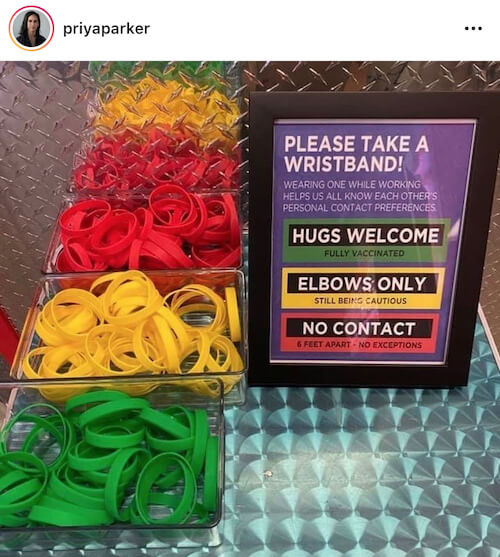
As people begin to meet up in person (at least here in the UK), for those of us who love to give and receive hugs, how do we know if people are open to that, or even to shake hands, or even to be within two metres of each other? Even if we ask, are we recognising sufficiently that some people may feel pressured to accede to our request for contact even if they don’t feel comfortable?
I loved this simple idea shared by Priya Parker, author of “The Art of Gathering” on Instagram. As Priya noted, I too particularly like the idea of signalling your behavioural preference, without getting into potentially uncomfortable conversations such as “have you been vaccinated?”. I also like the term “generous authority”.
For non-instagram users, sharing what she wrote:
It’s happening…as workplaces re-open, as live events crawl back to life, as we open our homes and theaters and places of worship, how do we navigate gathering in person again?
The hosts in this workplace are practicing generous authority. They’ve figured out a coding system to help their guests navigate each other in this moment of massive experimentation on literally how to interact.
Someone wrote me recently about suggesting color-coded t-shirts for her child’s birthday party for people to signal their vaccination status for safety. Other hosts are calling guests ahead of time to check comfort levels and vaccination statuses.
Is it OK to ask someone if they’ve been vaccinated? Do you let people lead? How do we create simple signals to let people feel safe and share information about comfort levels in a pro-social way?
This wristband experiment, where they’re not asking people’s vaccination rates but rather their BEHAVIORAL preferences, is super interesting to me.
We’re in a moment where, as we come back together again, we can create new codes and norms and etiquette to help a group do it’s work. These experiments are also mainstreaming practices around consent within communities.
Priya Parker
